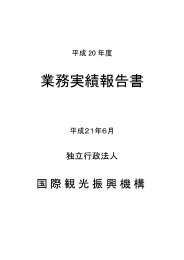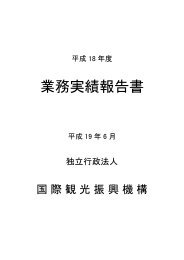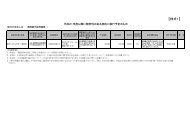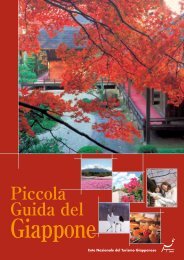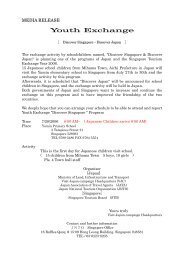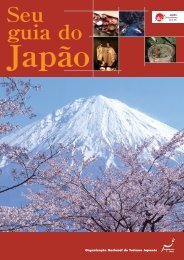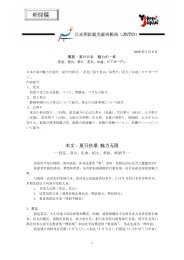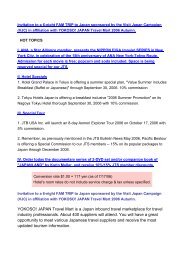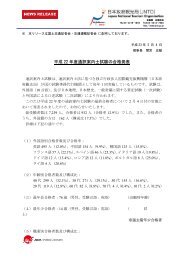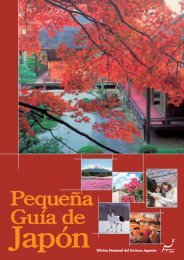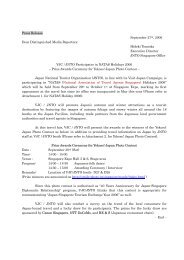Your Guide to - Japan National Tourist Organization
Your Guide to - Japan National Tourist Organization
Your Guide to - Japan National Tourist Organization
You also want an ePaper? Increase the reach of your titles
YUMPU automatically turns print PDFs into web optimized ePapers that Google loves.
38<br />
Accommodations<br />
<strong>Japan</strong> abounds in accommodations, both westernstyle<br />
and <strong>Japan</strong>ese. Types of accommodation vary<br />
widely in terms of style and price. You can choose <strong>to</strong><br />
stay in the familiar comforts of a western-style hotel, or<br />
enjoy the comfort and personal attention of a<br />
traditional <strong>Japan</strong>ese inn. By taking advantage of the<br />
extensive advice available from JNTO and taking<br />
some time <strong>to</strong> search out some of the nation's lesspublicized<br />
types of lodgings, you're sure <strong>to</strong> find clean<br />
and comfortable places <strong>to</strong> stay that suit your<br />
pocketbook.<br />
It is advisable <strong>to</strong> book your accommodation through<br />
a travel agent before coming <strong>to</strong> <strong>Japan</strong>.<br />
Western-style Hotels<br />
All of <strong>Japan</strong>'s cities have many western-style hotels,<br />
with famous-name chains well represented in all larger<br />
cities. In these hotels, the staff will speak English.<br />
Especially in peak <strong>to</strong>urist seasons, it is best <strong>to</strong> book far<br />
in advance.<br />
More than 230 member hotels of the <strong>Japan</strong> Hotel<br />
Association (JHA) (http://www.j-hotel.or.jp/) have<br />
consistently high standards of service and facilities.<br />
The majority of these hotels will have the same<br />
amenities as any western establishment in any<br />
country, including heating, TVs, air conditioning and<br />
swimming pools, with the possible additional services<br />
of interpreters and shopping and health centers.<br />
For example, in Tokyo, rooms at first-class hotels<br />
range from a low of ¥15,000 <strong>to</strong> ¥30,000 for a single<br />
with bath, and ¥25,000 <strong>to</strong> ¥68,000 for a twin with bath.<br />
Business Hotels<br />
One fairly recent addition <strong>to</strong> the <strong>Japan</strong> lodging<br />
network, which the cash-conscious <strong>to</strong>urist will<br />
appreciate, are Business Hotels. Found in all major<br />
cities and many mid-sized ones, business hotels are<br />
no-frills lodging aimed mainly at traveling <strong>Japan</strong>ese<br />
businessmen. Generally clean and comfortable, these<br />
hotels are usually smaller and offer fewer amenities<br />
than their upscale brethren — don't expect room<br />
service, for example.<br />
Business hotels are most commonly found<br />
conveniently close <strong>to</strong> train stations. Charges will<br />
average about ¥5,500 <strong>to</strong> ¥10,000 per person; rooms<br />
usually come only as singles. Twin or double-bed<br />
rooms — not many though — are also available.<br />
Ryokan<br />
For a stay in the same <strong>Japan</strong> as experienced by the<br />
most elegant Daimyo of bygone days, a night in a<br />
"ryokan," or <strong>Japan</strong>ese inn, is a must. A room in a<br />
ryokan is usually a single large, undivided room floored<br />
with traditional rice-straw "tatami" matting, with the<br />
only piece of furniture being a single low table. Doors<br />
are sliding "shoji" screens. Guests sleep on "fu<strong>to</strong>n"<br />
bedding laid out in the evening by maids.<br />
Most ryokan will have a communal bath, which is<br />
generally for separate sex bathing. Numerous superb<br />
hot-spring resorts, known as "onsen," are in fact<br />
ryokan built on the site of a hot spring. <strong>Your</strong> room<br />
charge will include two meals, invariably an evening<br />
feast of delicious, locally found ingredients, and a<br />
simple breakfast. Ryokan meals are generally served<br />
by the maid in the guest room. After the evening meal,<br />
your maid will return and clear your table, and then lay<br />
out your fu<strong>to</strong>n. The typical lounging wear of a ryokan, a<br />
blue and white-patterned cot<strong>to</strong>n robe called "yukata" is<br />
also provided.<br />
Dinner<br />
Tax and Service Charge:<br />
Generally, a 10-15% service charge is added in<br />
place of individual tipping and a 5% consumption tax<br />
is also imposed.<br />
In Tokyo, "Accommodation Tax" that is levied on all<br />
international and <strong>Japan</strong>ese guests who stay in hotels<br />
and ryokan priced at or above ¥10,000 per person<br />
per night excluding meals. The tax is ¥100 per person<br />
per night for those who stay at an establishment<br />
priced at between ¥10,000 and ¥14,999 and ¥200 for<br />
those who stay at an establishment priced at ¥15,000<br />
or more.




